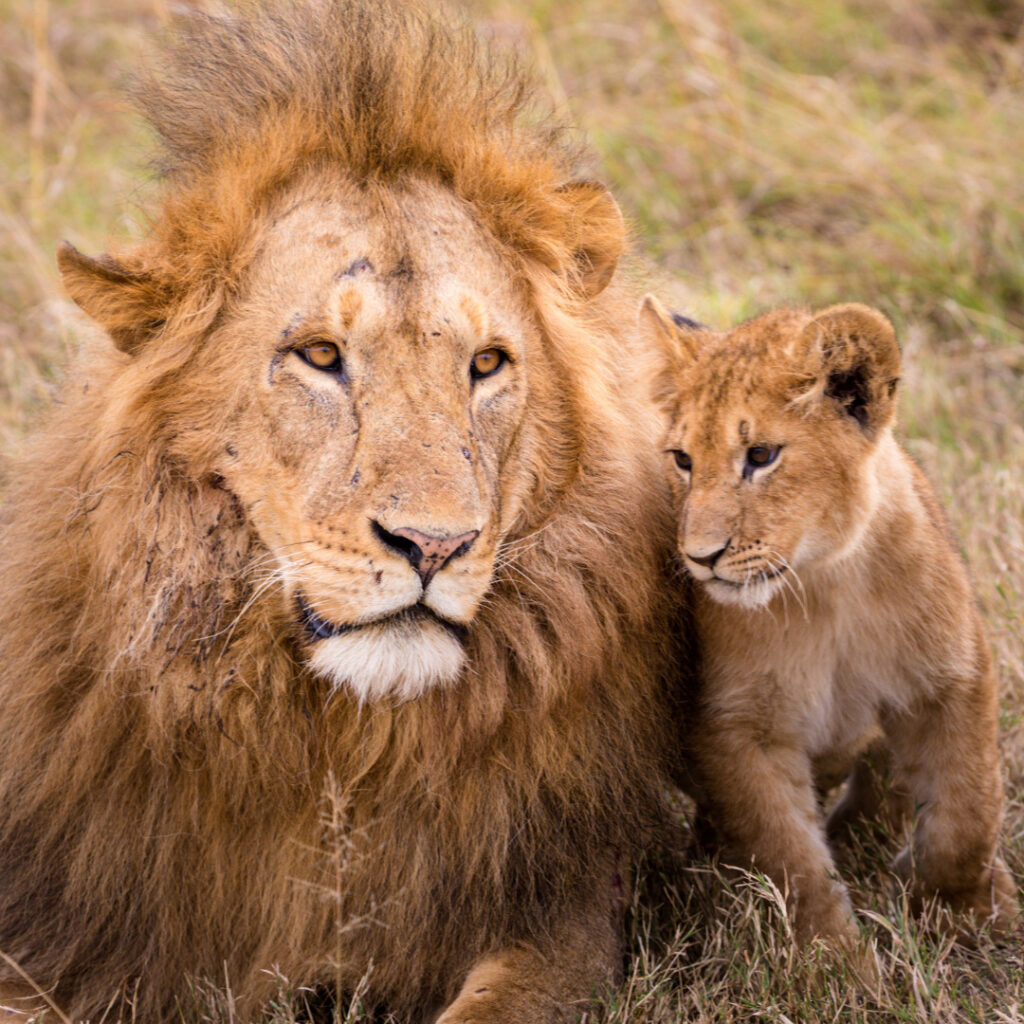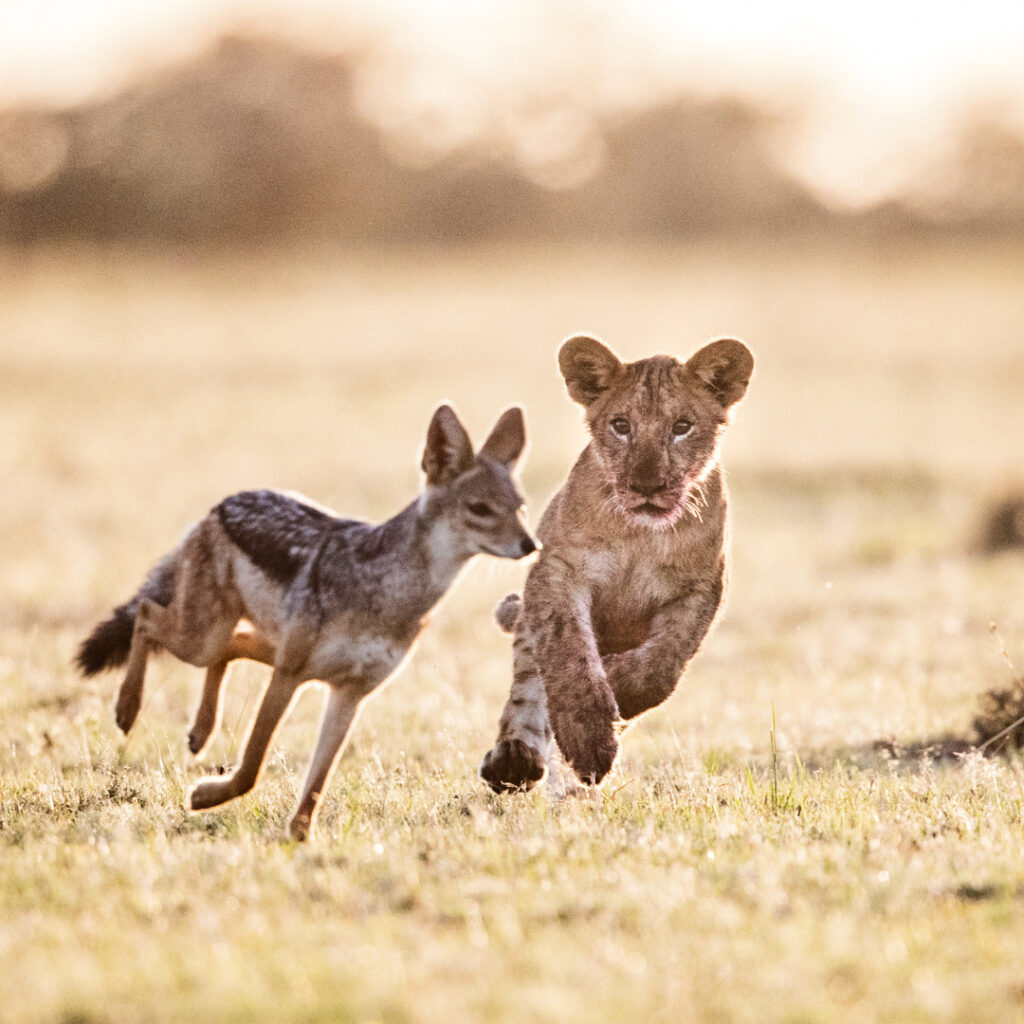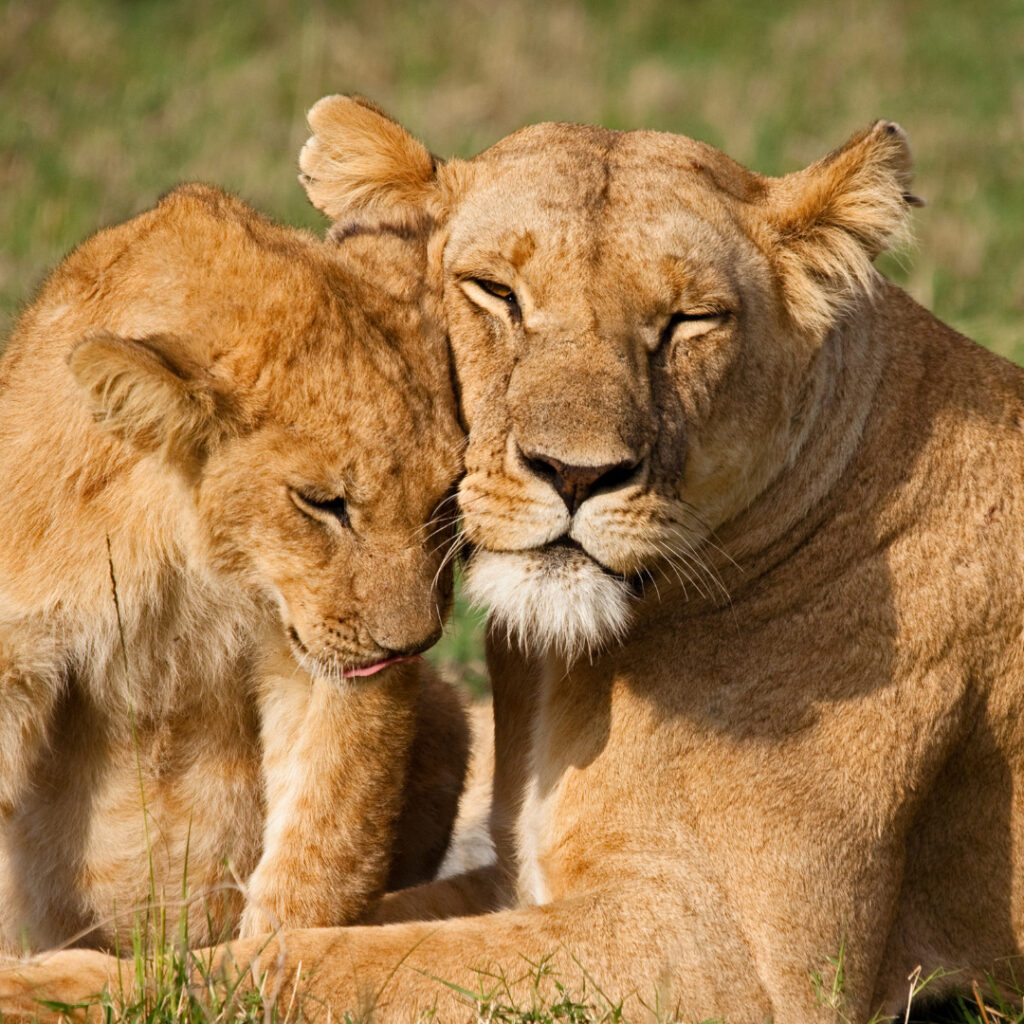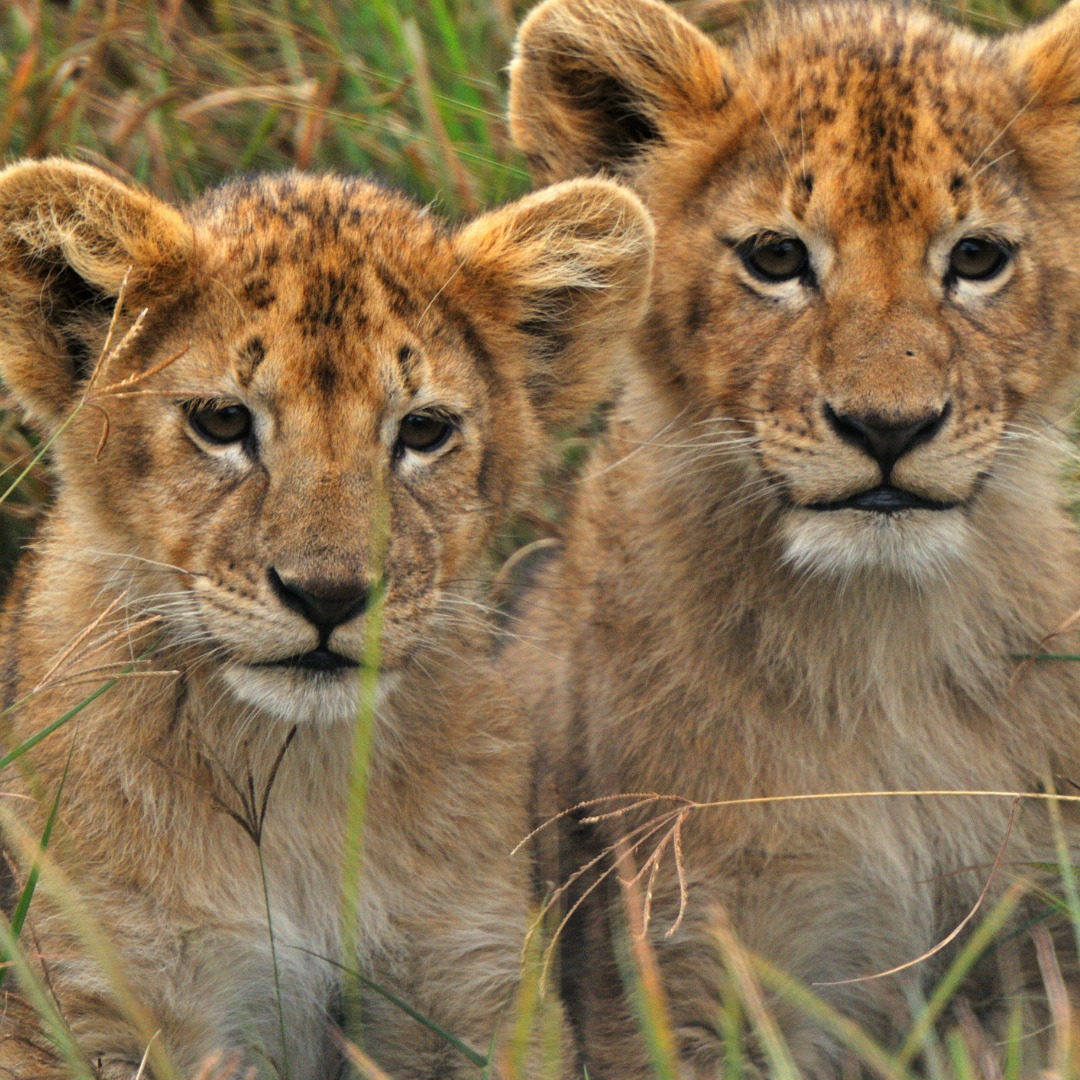1. When are lion cubs typically born?
Lion cubs can be born at any time of the year, with no specific breeding season prevalent among populations in the wild. However, in some instances, lionesses within a pride may synchronize their reproductive cycles, resulting in cubs being born around the same time. This synchronization can foster cooperative care, where lionesses assist each other in looking after and nursing the cubs, even allowing cubs that are not their own to suckle. This communal care strategy often enhances the survival rate of the newborn cubs by ensuring they are collectively protected and nurtured by multiple adults in the pride.
2. How many cubs are generally in a litter?
A typical lion litter comprises between two to four cubs, although it’s not uncommon for litters to occasionally include up to six offspring. The size of the litter can be influenced by various factors, including the health and age of the lioness, her nutritional status, and the environmental conditions within the territory. Larger litters are generally seen in environments where prey is abundant and the lioness is in optimal health. Lionesses give birth to such several cubs to ensure the survival of at least one, as mortality rates among lion cubs in the wild are notably high.
3. What is the average weight of a newborn lion cub?
Newborn lion cubs generally weigh between 1.2 to 2.3 kilograms (2.5 to 5 pounds). The precise weight can slightly vary based on genetics and the overall health of the mother during pregnancy. Like all mammals, the initial weeks of a lion cub’s life are crucial for its survival and growth. Mother’s milk provides them with all the necessary nutrients to gain weight and grow stronger. It is essential that they steadily increase in weight and strength to ensure they can keep up with the pride and are robust enough to withstand the challenges of life in the wild.

4. When do lion cubs begin to open their eyes?
Lion cubs are born blind and typically begin to open their eyes around 3 to 11 days after birth. Initially, their vision is quite poor and they rely heavily on their sense of smell and touch to navigate their immediate surroundings, primarily staying close to their mother for nourishment and protection. Gradually, as their eyesight improves over the weeks following their birth, cubs become more curious and exploratory, though they remain highly vulnerable and dependent on the adult lions in the pride for a considerable time before they can fend for themselves.
5. At what age do lion cubs start to walk?
Lion cubs generally start to walk at about two to three weeks of age. Initially, their movements are unsteady and awkward as they begin to explore their immediate surroundings under the watchful eye of their mother. Developing locomotor skills is crucial for cubs as it enables them to follow the pride, evade danger, and eventually learn hunting techniques. In the initial phases, you will often see them stumbling, playfully pouncing, and engaging with their siblings in activities that refine their physical abilities and social interactions within the safety of the pride’s territory.
6. When do lion cubs start eating solid food?
Lion cubs typically begin to consume solid food when they are around 3 months old, although they continue to nurse until they are approximately 6 to 7 months of age. The weaning process is gradual, with cubs initially learning to eat meat by observing and mimicking the behavior of older pride members. Adults will bring back fresh kills to the den area, allowing cubs to practice biting and chewing. As their teeth and digestive systems develop, the cubs become more adept at consuming and deriving nutrition from solid food, eventually becoming proficient hunters themselves.
7. How do mother lions care for their cubs?
Mother lions demonstrate devoted care towards their cubs, providing nourishment, protection, and early education in survival skills. For the first few weeks, lionesses often isolate themselves and their newborns in secluded den sites to protect them from potential threats. They nurse the cubs, keep them clean by licking them, and vigilantly guard them against predators, including rogue male lions. As the cubs grow, mothers introduce them to the pride and progressively involve them in social and hunting activities. They teach cubs necessary skills such as stalking, pouncing, and killing, vital for their future independence and survival in the wild.
8. Do male lions participate in raising the cubs?
Male lions play a limited, yet significant role in raising cubs. While the majority of parental care, including feeding, grooming, and teaching, is provided by the lionesses, males are pivotal in safeguarding the territory from rival prides and nomadic males, indirectly protecting the cubs from potential threats. Male lions ensure that the pride’s cubs are shielded from infanticide, which is a threat posed by outsider males who, upon taking over a pride, often kill existing cubs to bring the females into estrus and propagate their own lineage. Thus, a stable and strong male coalition is vital for cub survival.
9. When do lion cubs begin to play with each other?
Lion cubs start engaging in playful activities fairly early, often beginning around a few weeks of age. Play is integral to their development, offering them a safe context in which to practice future hunting and social skills. Cubs indulge in activities like chasing, pouncing, and play-fighting with their siblings and other young pride members, facilitating muscle development and coordination. This playful behavior also helps establish social bonds within the pride, understand hierarchical structures, and learn to communicate through physical and vocal cues, which are crucial aspects of social cohesion in lion prides.
10. At what age do cubs begin to hunt?
Lion cubs start to learn the basics of hunting by observing their mothers and other pride members from about three months of age, but they typically begin to actively participate in hunting activities when they are around one year old. Initially, their attempts may be more disruptive than helpful during hunts, but these experiences are vital for honing their skills. Through observation, participation, and playful practice with siblings, cubs gradually learn the art of stalking, chasing, and ambushing prey, becoming proficient hunters by the time they are around two years old, contributing effectively to the pride’s sustenance.
11. How do lion cubs communicate with their mothers?
Lion cubs communicate with their mothers and other pride members through a variety of vocalizations, body language, and scents. Vocal signals like mews, grunts, and chirps help cubs express needs or convey their emotional state, such as distress or contentment. Physical contact, such as nuzzling or pawing, further strengthens social bonds and provides a sense of security to the cubs. Scent marking, through cheek rubbing or head bunting, also plays a role in establishing familiar olfactory cues among pride members, aiding in the recognition and establishment of social hierarchy as they interact.
12. Why do lion cubs have spots?
Lion cubs are born with a rosette-patterned coat that helps them blend into their surroundings, providing camouflage which is crucial for their survival in the initial months. The spotted pattern, resembling the dappled light and shade found in their natural habitat, enables cubs to remain concealed when the lioness hides them in vegetation while she goes hunting. These spots are particularly helpful in protecting defenseless cubs from predators like hyenas or leopards, which may pose a threat during the mother’s absence. The spots gradually fade as the cubs grow, usually disappearing by the time they reach adulthood.

13. When do lion cubs lose their spots?
Lion cubs typically start to lose their spotted patterns as they mature, with the spots becoming less pronounced over time. This process generally begins around three months of age and continues until they are about two years old, although the rate at which the spots fade can vary. By the time lions reach full adulthood, their coats are usually a solid, tawny color, although faint remnants of their juvenile patterning may sometimes persist, particularly on their belly and legs, depending on the individual’s genetic makeup and regional variations among populations.
14. Are lion cubs born with teeth?
Lion cubs are born with deciduous teeth (also known as milk or baby teeth) that start to emerge at around two to three weeks of age. These initial teeth are small, sharp, and suited to their early dietary needs, allowing them to nurse effectively from their mother. As cubs transition to solid food and grow, their milk teeth gradually fall out and are replaced by a permanent set of adult teeth, typically by the age of six to seven months. This adult dentition, comprised of powerful canines and carnassials, equips them for a predatory lifestyle.
15. When do lion cubs start to grow their mane?
Male lion cubs begin to show the first signs of mane development around one year of age, although it starts as little more than a slight roughening of the fur around the neck and throat. The mane continues to grow and darken as the cub matures, typically becoming noticeable by the age of two. Full mane development, which is influenced by factors such as genetics, nutrition, and testosterone levels, is usually attained between the ages of four and five. Female lions, or lionesses, do not grow a mane, making the feature a distinctive characteristic of adult males.
16. How are lion cubs taught to hunt?
Lion cubs learn to hunt primarily through observation and participation in group hunts with their pride. Initially, cubs observe the hunting techniques of adult pride members, watching how they stalk, ambush, and take down prey. As they grow, older cubs are allowed to participate, initially practicing their skills on smaller prey under the watchful guidance of the adults. Play-fighting and play-hunting with their siblings and other young pride members also serve as vital practice, allowing cubs to refine their stalking, pouncing, and killing techniques in a safe, playful context before they participate in actual hunts.
17. Do lion cubs face threats from within their own pride?
While a pride generally provides safety and support, lion cubs may face some threats from within their social structure. A notable risk arises when a new male or coalition of males takes over the pride. New dominant males may commit infanticide, killing existing cubs to bring the lionesses into estrus more quickly, thereby enabling them to sire their own offspring. Otherwise, prides are typically supportive environments for cubs, with all members contributing to their protection and upbringing in various ways, ensuring they learn the necessary skills for survival in the wild.
18. When do lion cubs become independent?
Lion cubs begin to gain independence gradually as they mature, progressively participating more actively in pride activities like hunting and territorial defense as they grow. Full independence is usually attained between the ages of 2 and 3, when young lions may start to explore areas outside the pride’s territory and engage in more solo hunting endeavors. Male lions, in particular, may leave or be driven out of their natal pride around this age, either becoming nomadic or forming coalitions with other males, while females may remain with their natal pride for life, contributing to its continuity.
19. What is the mortality rate for lion cubs?
Lion cub mortality rates are notably high in the wild, with estimates suggesting that approximately 50% to 80% of cubs die before reaching the age of two. Various factors contribute to this high mortality, including predation by other carnivores, starvation, disease, and injuries. Additionally, infanticide by males seeking to establish dominance over a pride and sire their own offspring is also a significant threat to cub survival. The harsh realities of life in the wild mean that only the strongest and most fortunate cubs will survive to adulthood and potentially reproduce.
20. How do lion prides protect their cubs?
Lion prides protect their cubs through a collective and cooperative effort, employing various strategies to ensure their safety. Lionesses often give birth and raise their initial weeks in secluded areas to shield newborns from potential threats. As cubs are introduced to the pride, all members play a role in their protection. Adult males defend the territory from rival prides and nomadic lions, preventing outsider males that might commit infanticide from accessing the cubs. Lionesses work together to safeguard cubs from other threats, such as predators and harsh environmental conditions, and often communally nurse and care for each other’s offspring.

21. How do lion cubs socialize within the pride?
Lion cubs socialize within the pride through playful interactions, vocalizations, and physical contact with both siblings and adult pride members. Play is essential for social bonding and also serves as practice for hunting and fighting skills. Cubs learn to communicate through various vocal signals like grunts, growls, and purrs and engage in activities like play-chasing and mock-fighting, which help them understand social hierarchies and strengthen bonds with pride members, thereby establishing their place within the social structure of the pride.
22. Can lion cubs swim?
While lions are not renowned for their love of water, lion cubs, like all lions, are capable of swimming. They may be introduced to water sources for drinking at a very young age and occasionally might need to cross bodies of water while following their pride. Cub curiosity may also lead to exploratory paddles in safe and shallow waters. However, it’s not typical for lions to swim regularly, and they usually avoid it unless necessary, as larger bodies of water might contain threats like crocodiles.
23. Why do lion cubs play?
Play is crucial for lion cubs as it contributes significantly to their physical development, social integration, and learning of vital survival skills. Through play, cubs practice hunting strategies, such as stalking and pouncing, in a low-risk environment. Play also helps establish and understand social hierarchies, strengthen social bonds, and improve communication skills within the pride. Furthermore, playful activities enhance the development of their muscular and neural systems, ensuring that they grow into capable and efficient predators as they mature.
24. Do lionesses ever adopt orphaned cubs?
There are instances where lionesses have been observed adopting orphaned cubs, especially within closely related pride members. A lioness might allow an orphaned cub to suckle alongside her own cubs, particularly if the orphaned cub is closely related to her, thus ensuring the continuation of shared genetics. However, adoption is not guaranteed and depends on various factors, including the adoptive mother’s lactation status, the availability of resources, and the age and health of the cub.
25. How do cubs interact with adult male lions?
While male lions are not as involved in direct parental care as lionesses, cubs do interact with them. Cubs might approach and initiate play with adult males, who can be tolerant of, and sometimes participative in, these playful interactions. Males also provide indirect care by protecting the territory from threats that could harm cubs, such as rival males or predator incursions. However, if a new male or coalition takes over a pride, existing cubs are at risk of infanticide as the new males seek to establish their own lineage.
26. What is the life expectancy of lion cubs?
The life expectancy of lion cubs that survive the first, perilous months of life and make it to adulthood is typically around 8-12 years in the wild. However, considering the high mortality rates among cubs due to factors like predation, disease, and starvation, many do not reach adulthood. Cubs that do survive often face numerous challenges, including competition for food, territorial disputes, and threats from other predators, which influence their longevity in the harsh conditions of the wild.
27. When do lion cubs get their first meat?
Lion cubs are introduced to meat when they are about three months old, as they begin the weaning process and transition towards a solid diet. Initially, lionesses will bring killed prey close to the den to allow cubs to practice eating meat in a safe, proximate environment. Cubs learn by watching adults and experimenting with biting and tearing flesh themselves. While they are introduced to meat at this age, they continue to nurse for several months until they can fully subsist on a diet of prey.
28. Do all cubs in a litter survive?
Unfortunately, not all cubs in a litter are likely to survive to adulthood due to the myriad of challenges they face early in life. Threats, such as predation, disease, and starvation, significantly impact cub survival rates. Furthermore, if a new male takes over the pride, existing cubs are often killed to bring the lionesses into estrus sooner. It is common in the wild for only a fraction of all born cubs to reach maturity and potentially have offspring of their own.
29. How do cubs behave during a hunt?
During the early stages of learning to hunt, cubs are often more of a hindrance than a help to the hunting lionesses. They might prematurely alert prey, disrupting the hunt due to their lack of skill and understanding. As cubs grow and observe more hunts, they slowly learn the necessary skills and discipline required. Eventually, through observation and participation, they become adept hunters, contributing to the pride’s hunting efforts and ensuring their own survival and that of future offspring.
30. What predators do lion cubs have to be wary of?
Lion cubs face threats from a variety of predators, including hyenas, leopards, pythons, and even birds of prey when they are very young. Additionally, they need to be wary of adult male lions from outside their pride or new males taking over, who might commit infanticide to establish their lineage more quickly. In the initial weeks of their life, lionesses hide their cubs in secluded spots to protect them from such threats, and as they grow, the pride plays a vital role in safeguarding them against these potential dangers.
